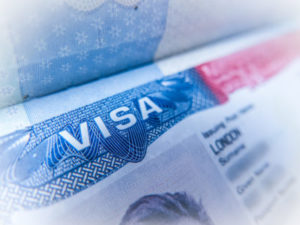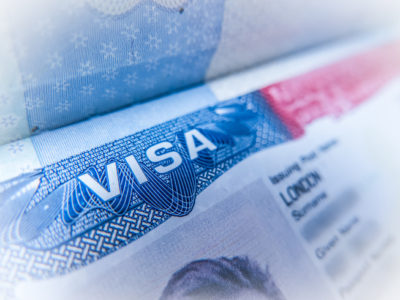At the Sutardja Center for Entrepreneurship & Technology, we welcome many international students to our programs. But what happens after graduation? Our thanks to SCET mentor Nadia Yakoob for contributing the article below to help students understand options for staying in the U.S. after graduation to build a startup, work, or study. Also, please read her other articles in the series to understand how Optional Practical Training (OPT) works, what the requirements for an H-1B Visa are, and how to obtain an L-1 or E-2 Visa.
International students in the U.S. are some the brightest and most talented individuals in the world. But US employers who want to hire them face the H-1B visa limit, which I covered in my last article. Many international students prefer to apply their skills and U.S. education by launching a business in the U.S., but this disqualifies them from most employment-based visas because they cannot be sponsored by a company in which they have an ownership interest. Given these constraints, one visa that is worth considering is the O-1 visa for individuals of extraordinary ability.
A few words of caution: after you read through the eligibility criteria, you may think this visa is not right for you. Maybe. But maybe it’s not the right visa at this time. I encourage all my clients to review the criteria, create a folder (googledrive, dropbox, or old-fashioned paper), and start collecting evidence of their accomplishments and accolades. Often, it’s just a matter of time before you have substantial evidence of your expertise in your field.
What Kind of Evidence Shows Extraordinary Ability for the O-1 Visa?
In order to qualify for the O-1 visa, you must 1) work in a capacity requiring extraordinary ability; and 2) show evidence of your extraordinary ability to work in this capacity. Please note that if you are an artist of extraordinary ability, the eligibility criteria are different.[1]
Broadly speaking, you must show you are considered one of the best in your field. I normally ask my clients to define their field of expertise as narrowly as possible. Then, we start looking at which of the eligibility criteria they could meet. Most of my clients are not recipients of the Nobel Prize or Academy Award, so we skip (A) and go straight to finding at least three of the eight criteria enumerated by the U.S. Citizenship and Immigration Services under (B).
- (A) Receipt of a major internationally recognized award, such as the Nobel Prize; OR
- (B) At least three (3) of the following forms of documentation:
- Nationally or internationally recognized prizes or awards for excellence in the field of expertise;
- Membership in associations in the field for which classification is sought, which require outstanding achievements of their members;
- Published material in professional or major trade publications or major media about you, relating to your work in the area of expertise;
- Participation on a panel, or individually, as a judge of the work of others in the same or in an allied field of specialization;
- Original scientific, scholarly, or business-related contributions of major significance in the field;
- Authorship of scholarly articles in the field, in professional journals, or other major media;
- Employment in a critical or essential capacity for organizations and establishments that have a distinguished reputation; and
- You have been paid a high salary or will command a high salary or other remuneration for services.
In addition to showing at least three of the criteria listed above, we normally seek six to eight testimonial letters from experts in your field who can confirm your extraordinary ability (make sure to keep a list of possible references in your folder of evidence). While the immigration regulations require showing at least three of the eight criteria, we always try to qualify under as many of the criteria as possible.
Can a Company I Start or Own Sponsor Me?
Yes. Unlike the H-1B Visa, which I discussed in my last article, and several other employment-based visas that will be covered in a later article (like the TN and E-3 visas), you can have an ownership interest in the company that sponsors you for the O-1 visa. This is not uncommon. That said, you must show evidence of your petitioner being an established company, such as proof of a Federal Employer Identification Number, incorporation documents or a business license, proof of funds to pay you a salary, and an office space, with your O-1 petition.
Is there a Limit to the Number of O-1 Visas Available?
There is no annual limit to the number of O-1 visas available each year, which makes it a visa worth exploring given the annual limit on the H-1B.
How Long Can I Stay in O-1 Status and Can I Work for Others?
O-1 status initially is granted for three years. After that, you can seek yearly extensions with no statutory limit to the total number of years you can stay in the U.S. in O-1 status. Many individuals on the O-1 visa eventually apply for permanent residence based on extraordinary ability, so they do not end up seeking too many one-year extensions.
You are tied to your sponsoring employer in O-1 status. You may work for another employer if it sponsors you for O-1 classification.
One note about your dependents, they can join you in O-3 status, but your spouse is not given work authorization (big bummer). This is another reason why many O-1 visa holders seek permanent residence because their dependents also get permanent residence, which gives unrestricted right to work.
Intrigued? Please feel free to contact me at nadia@swlgpc.com so we can discuss your eligibility for the O-1 visa.
[1] Please refer to the information on the O-1B visa at https://www.uscis.gov/working-united-states/temporary-workers/o-1-visa-individuals-extraordinary-ability-or-achievement
At the Sutardja Center for Entrepreneurship & Technology, we welcome many international students to our programs. But what happens after graduation? Our thanks to SCET mentor Nadia Yakoob for contributing the article below to help students understand options for staying in the U.S. after graduation to build a startup, work, or study. Also, please read her other articles in the series to understand how Optional Practical Training (OPT) works, what the requirements for an H-1B Visa are, and how to obtain an L-1 or E-2 Visa.
International students in the U.S. are some the brightest and most talented individuals in the world. But US employers who want to hire them face the H-1B visa limit, which I covered in my last article. Many international students prefer to apply their skills and U.S. education by launching a business in the U.S., but this disqualifies them from most employment-based visas because they cannot be sponsored by a company in which they have an ownership interest. Given these constraints, one visa that is worth considering is the O-1 visa for individuals of extraordinary ability.
A few words of caution: after you read through the eligibility criteria, you may think this visa is not right for you. Maybe. But maybe it’s not the right visa at this time. I encourage all my clients to review the criteria, create a folder (googledrive, dropbox, or old-fashioned paper), and start collecting evidence of their accomplishments and accolades. Often, it’s just a matter of time before you have substantial evidence of your expertise in your field.
What Kind of Evidence Shows Extraordinary Ability for the O-1 Visa?
In order to qualify for the O-1 visa, you must 1) work in a capacity requiring extraordinary ability; and 2) show evidence of your extraordinary ability to work in this capacity. Please note that if you are an artist of extraordinary ability, the eligibility criteria are different.[1]
Broadly speaking, you must show you are considered one of the best in your field. I normally ask my clients to define their field of expertise as narrowly as possible. Then, we start looking at which of the eligibility criteria they could meet. Most of my clients are not recipients of the Nobel Prize or Academy Award, so we skip (A) and go straight to finding at least three of the eight criteria enumerated by the U.S. Citizenship and Immigration Services under (B).
- (A) Receipt of a major internationally recognized award, such as the Nobel Prize; OR
- (B) At least three (3) of the following forms of documentation:
- Nationally or internationally recognized prizes or awards for excellence in the field of expertise;
- Membership in associations in the field for which classification is sought, which require outstanding achievements of their members;
- Published material in professional or major trade publications or major media about you, relating to your work in the area of expertise;
- Participation on a panel, or individually, as a judge of the work of others in the same or in an allied field of specialization;
- Original scientific, scholarly, or business-related contributions of major significance in the field;
- Authorship of scholarly articles in the field, in professional journals, or other major media;
- Employment in a critical or essential capacity for organizations and establishments that have a distinguished reputation; and
- You have been paid a high salary or will command a high salary or other remuneration for services.
In addition to showing at least three of the criteria listed above, we normally seek six to eight testimonial letters from experts in your field who can confirm your extraordinary ability (make sure to keep a list of possible references in your folder of evidence). While the immigration regulations require showing at least three of the eight criteria, we always try to qualify under as many of the criteria as possible.
Can a Company I Start or Own Sponsor Me?
Yes. Unlike the H-1B Visa, which I discussed in my last article, and several other employment-based visas that will be covered in a later article (like the TN and E-3 visas), you can have an ownership interest in the company that sponsors you for the O-1 visa. This is not uncommon. That said, you must show evidence of your petitioner being an established company, such as proof of a Federal Employer Identification Number, incorporation documents or a business license, proof of funds to pay you a salary, and an office space, with your O-1 petition.
Is there a Limit to the Number of O-1 Visas Available?
There is no annual limit to the number of O-1 visas available each year, which makes it a visa worth exploring given the annual limit on the H-1B.
How Long Can I Stay in O-1 Status and Can I Work for Others?
O-1 status initially is granted for three years. After that, you can seek yearly extensions with no statutory limit to the total number of years you can stay in the U.S. in O-1 status. Many individuals on the O-1 visa eventually apply for permanent residence based on extraordinary ability, so they do not end up seeking too many one-year extensions.
You are tied to your sponsoring employer in O-1 status. You may work for another employer if it sponsors you for O-1 classification.
One note about your dependents, they can join you in O-3 status, but your spouse is not given work authorization (big bummer). This is another reason why many O-1 visa holders seek permanent residence because their dependents also get permanent residence, which gives unrestricted right to work.
Intrigued? Please feel free to contact me at nadia@swlgpc.com so we can discuss your eligibility for the O-1 visa.
[1] Please refer to the information on the O-1B visa at https://www.uscis.gov/working-united-states/temporary-workers/o-1-visa-individuals-extraordinary-ability-or-achievement


